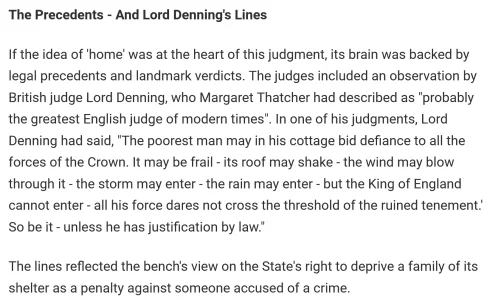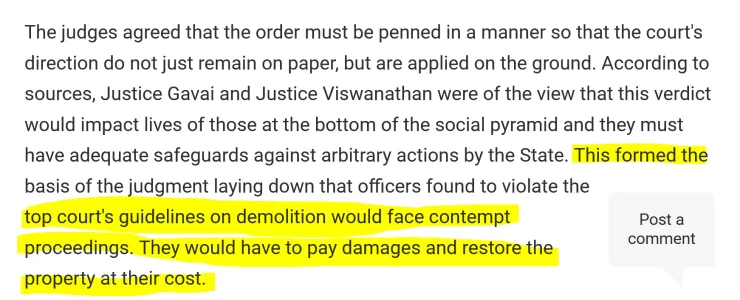The bench’s directions include that no demolition shall be carried out without a prior show-cause notice that would give 15 days or the time mentioned in the local municipal laws to the person who is served with it to respond to the allegations of unauthorised construction.
While a notice shall be served upon the owner/occupier by registered post, it, the court directed, shall also be “affixed conspicuously on the outer portion of the structure in question”. The 15-day time period or deadline under the local bye-law to respond to the notice shall start from the date of receipt of the notice.
The demolition notice, the court said, shall contain details regarding the nature of unauthorised construction and details of the specific violation and the grounds of demolition. The notice should specify the list of documents which the recipient is required to furnish along with the reply and also mention the particular date fixed to have a personal hearing of the recipient before the designated authority.
To avoid allegation of backdating of demolition notices, the court directed that immediate intimation must be sent to the office of the Collector or District Magistrate (DM) digitally by email, and an auto-generated reply acknowledging receipt of the mail should also be issued from the office of the Collector/DM.
Every municipal or local authority shall assign a designated digital portal, within three months from today, on which details regarding service/pasting of the notice, the reply, the show-cause notice and the final order passed would be available.
Apart from giving a personal hearing to the notice recipient, the court has made it compulsory for the designated authority to record the minutes of the hearing.
A final order shall be passed only after an opportunity of hearing is provided to know the response of the person accused of unauthorised construction. It must state with clarity as to whether the authority had exhausted other remedies before initiating the extreme step of demolition.
‘Demolition proceedings to be video-graphed’
The judgement also highlighted the points that should be kept in mind by the designated authority at the time of dictating the final order.
The bench said the contentions given in response to the demolition notice must find a place in the final order and the designated authority should give reasons for agreeing or disagreeing with it.
Considering some unauthorised constructions are compoundable (can be legalised), it said the final order rejecting the explanation must record whether the portion of the structure sought to be demolished can be regularised upon payment of fee. If not, then the order must furnish reasons for arriving at such a conclusion.
Reasons must be mentioned even if the designated authority finds that only part of the construction is unauthorised and non-compoundable.
The final order must explain why demolition “is the only option available and other options like compounding and demolishing only part of the property are not available”.
Only that portion shall be demolished that is found to be unauthorised and not compoundable, the court said. Before the action, it mandated, the authority concerned shall prepare a detailed inspection report of the site and get is signed by two witnesses.
The entire demolition proceedings should be video-graphed and the authority shall prepare a demolition report giving the list of police officials and civil personnel that participated in the demolition process.
Video recordings are to be preserved, the bench said, as it ordered preparation of a demolition report, which in terms of the direction would be mailed to the municipal commissioner.

en.wikipedia.org











